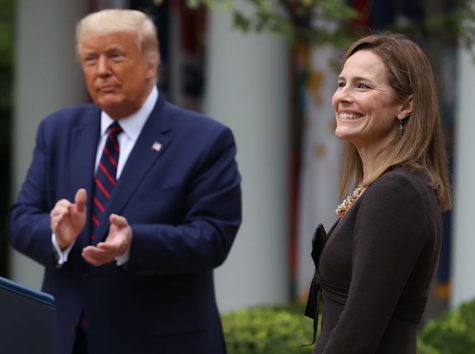Trump’s Supreme Court Nomination
How will Amy Coney Barrett’s potential induction to the Supreme Court impact us after RBG’s death?
The death of former Supreme Court Justice Ruth Bader Ginsburg became an important turning point in the 2020 presidential election. RBG was a pioneer of equality, especially women’s rights. She fought for education, reproductive rights, and closing the wage gap, among others.
Now, President Trump and the Republican party is trying to pass the nomination of a new Justice: Amy Coney Barrett.

Trump announced his nomination on Saturday, September 26th, facing liberal backlash for Barrett’s strong Catholic beliefs. Some people are worried that her faith will dominate her allegiance to the Constitution, and that her induction to the SC will interfere with policies on abortion, healthcare, and LGBTQ+ rights.
In terms of policy, Barrett is the opposite of RBG. If her nomination is passed, she may reverse nearly everything Ginsburg fought for. Barrett, unlike Ginsburg, is very openly pro-life, an immense threat to reproductive rights. People are most concerned that the court will overturn Roe v. Wade, the 1973 Supreme Court case that legalized abortion. According to Barrett, Roe v. Wade cannot be considered a superprecedent or “a decision so widely accepted that it is invulnerable to serious legal challenges that could see it overturned,” because there is still unresolved controversy surrounding abortion. Now, the bigger question is whether or not her nomination will be confirmed.
As of today, the presidential election is 20 days away. Republican senators are determined to get Barrett’s nomination confirmed before November 3rd, and this is the closest to an election the senate has tried to confirm a justice. The average length of a SCOTUS confirmation is 70 days, yet the Trump administration is attempting to do it in only 38 days.

Following Trump’s announcement of Barrett’s nomination at Rose Garden, he and many of his major supporters, including Melania Trump and Kelly-Anne Conway, tested positive for Coronavirus. And though some thought it would be, this was not much of a roadblock in the way of her confirmation. Although it delayed the process, Barrett’s final day of questioning was Wednesday, October 14th.
Since it is so close to the election, Joe Biden, Kamala Harris, and other democrats in opposition of Barrett’s confirmation believe that the current presidency should not be allowed to fill the seat. Instead, it should be left up to the people. After the election, there could be a new senate majority and president, so voters should be able to “choose” a new justice. This means that if Joe Biden wins, he will likely nominate a more liberal candidate. There has also been speculation that if elected, he and Kamala Harris would pack the court, or add more seats. However, neither has directly confirmed nor denied this.
For now, we can assume that the Trump administration will go ahead with the confirmation, so here are some final takeaways from her three days of questioning.
- When presented with certain issues like the Affordable Care Act and abortion, she refuses to give a preview of how she would rule. Her judicial record can be used to predict future rulings, but much of what she said in questioning contradicts her ruling history. For example, when asked about Roe v. Wade, she did not say how she would rule, but she is openly pro-life. So why couldn’t she provide a direct answer?
- In terms of healthcare, she claims that she will not be “hostile” to the law and consider all sides. But, President Trump has a clear agenda to abolish ObamaCare. His influence is clear throughout the entire Republican party, so it may be difficult to judge how far his reach goes. Specifically for Barrett, when she was asked whether or not Trump should be able to pardon himself of tax fraud, she declined to answer but responded with: “no one is above the law.”
- Her confirmation would give the U.S. Supreme Court a six to three conservative majority.
No matter what happens, it is very likely that Barrett’s nomination will be confirmed either before the election or between the election and inauguration. Regardless, this process will continue to have an impact on the fast-approaching election, as it will be brought up in the final two presidential debates and likely change or strengthen voter’s opinions in the election.

Trisha Balani is a senior, an editor at Nest Network and a devoted Swiftie. Trisha wants to help Nest Network grow by teaching other writers the skills...





